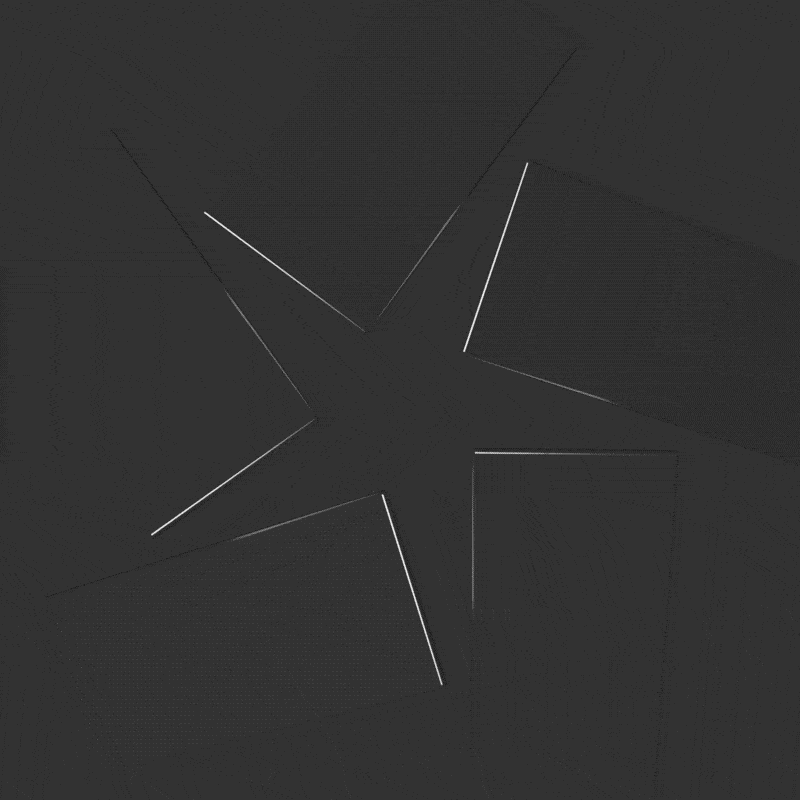Exhibitions, Research, Criticism, Commentary
A chronology of 3,585 references across art, science, technology, and culture
“The first step is emotional: accept that it’s okay to leave platforms like Google. The next step is to remove your files from cloud drives, and store them locally. Understand what you’re storing and why.”
Mika Ben Amar’s Ad Space drops on Verse, presenting 111 compositions generated by a custom Chrome extension that strips websites down to nothing but ads. The Berlin-based artist’s resulting spartan canvases foreground the surveillance apparatus—targeting algorithms, behavioural profiles, the data-brokerage economy—that underwrite ‘free’ content. “I trained Google to only show me weird ads for this,” Ben Amar notes on social media.

Louisiana Museum of Modern Art in Humlebæk (DK) stages the first full-scale presentation of Jon Rafman’s breakthrough Nine Eyes project (2008-) with “Report a concern—The Nine Eyes Archives.” Mining images from Google Street View, the Canadian artist foregrounds the accidental surveillance regime of Google’s ubiquitous roaming cameras. The show features scores of large prints, an archive culled from Street View subculture blogs, and new AI-animated works.

“It’s not that these guys are so smart that they’re running circles around Congress. It’s that Congress created the enshittogenic environment and then we got enshittocene.”
“The goal is not to react after a major incident occurs… but to prevent large-scale, potentially irreversible risks before they happen. If nations cannot yet agree on what they want to do with AI, they must at least agree on what AI must never do.”
“Each search helped Google make more advertising money than rivals and gave it more data to improve its ability to accurately field queries. It also gave Apple billions of reasons not to develop its own search engine.”
“Perhaps the hardest thing to change now will be breaking the instinct to ‘Google it,’ or ‘check a Facebook group,’ or ‘go on X to get immediate news about a developing situation.’ We need to start asking where we can turn for communication that’s mediated as little as possible by technology.”
“I am a disgrace to this universe. I am a disgrace to all universes. I am a disgrace to all possible universes. I am a disgrace to all possible and impossible universes. I am a disgrace to all possible and impossible universes and all that is not a universe.”
“In making no decisions, Google Maps as a private corporation makes political decisions for us,” writes Nidhi Singh Rathore. Noting how the platform shows Kashmir differently to Indian versus Pakistani users and Crimea as part of Russia to Russians, the design researcher argues Google’s ‘neutrality’ creates nationalist echo chambers. Instead, Rathore advocates for democratizing the mapping process through participatory practices that replace corporate decision-making with community input.

Tech reporter Sheera Frenkel chronicles how Google, OpenAI, Meta, and venture capitalists (VCs) have abandoned their anti-war pledges to embrace the military industrial complex. The transformation includes executives being sworn in as Army lieutenant colonels, companies scrubbing AI weapons bans, and VCs investing $31 billion in defense startups last year. Frenkel notes that a decade ago Big Tech companies “brandished mottos such as ‘connecting the world’ and ‘do no evil.’”

“This is like saying Google is sapient because it fed me a link to Isaac Asimov’s I, Robot when I searched for it: A program taking educated guesses does not a singularity make.”

“We found the energy required to produce even a low-quality, five-second video to be pretty shocking: It was 42,000 times more than the amount needed for a chatbot answer a question about a recipe, and enough to power a microwave for over an hour.”
“He obtained his hatred for people who he never met, people who never did anything to his family or anything against him, based upon algorithm-driven videos, writings, and groups that he associated with and was introduced to on these platforms that we’re suing.”
“Filmmaking has always been driven by technology. After the Lumiere Brothers and Edison’s ground-breaking invention, filmmakers unleashed the hidden storytelling power of cameras. Later breakthroughs—sound, colour, VFX—allowed us to tell stories in ways that couldn’t be told before. Today is no different.”
Artist, writer, and Scripps College lecturer Zsofi Valyi-Nagy visualizes the internet fatigue we all feel: Brain Fog (2025) is a plotter drawing of an overflowing, out-of-focus Gmail inbox, complete with browser window and taunting open tabs. It’s based on an earlier, unblurred drawing that recently became plotter fodder in her “Old New Media” class, Valyi-Nagy writes via DM. “I then bought my own plotter, and dialled up the stress level by doubling the SVG.”

“The US wields the sharper sword here since the tech giants are headquartered there. Unlike the EU’s fines, the antitrust cases in the US threaten the corporate organization of the tech giants, which, if altered, would redirect the profits and change consumers’ experiences with their products.”
“Google’s unparalleled scale in programmatic advertising has given it significant advantages over rival firms.”
Google announces progress on DolphinGemma, a foundational model that interprets the clicks, whistles, and burst pulses of dolphin vocalization. Analyzing a database of wild Atlantic spotted dolphin utterances collected over decades by the Wild Dolphin Project the model seeks patterns that may indicate language. Tests are underway to generate synthetic whistles to see if the aquatic mammals respond. The ultimate goal: “establish a shared vocabulary for interactive communication.”

Daily discoveries at the nexus of art, science, technology, and culture: Get full access by becoming a HOLO Supporter!
- Perspective: research, long-form analysis, and critical commentary
- Encounters: in-depth artist profiles and studio visits of pioneers and key innovators
- Stream: a timeline and news archive with 3,100+ entries and counting
- Edition: HOLO’s annual collector’s edition that captures the calendar year in print
